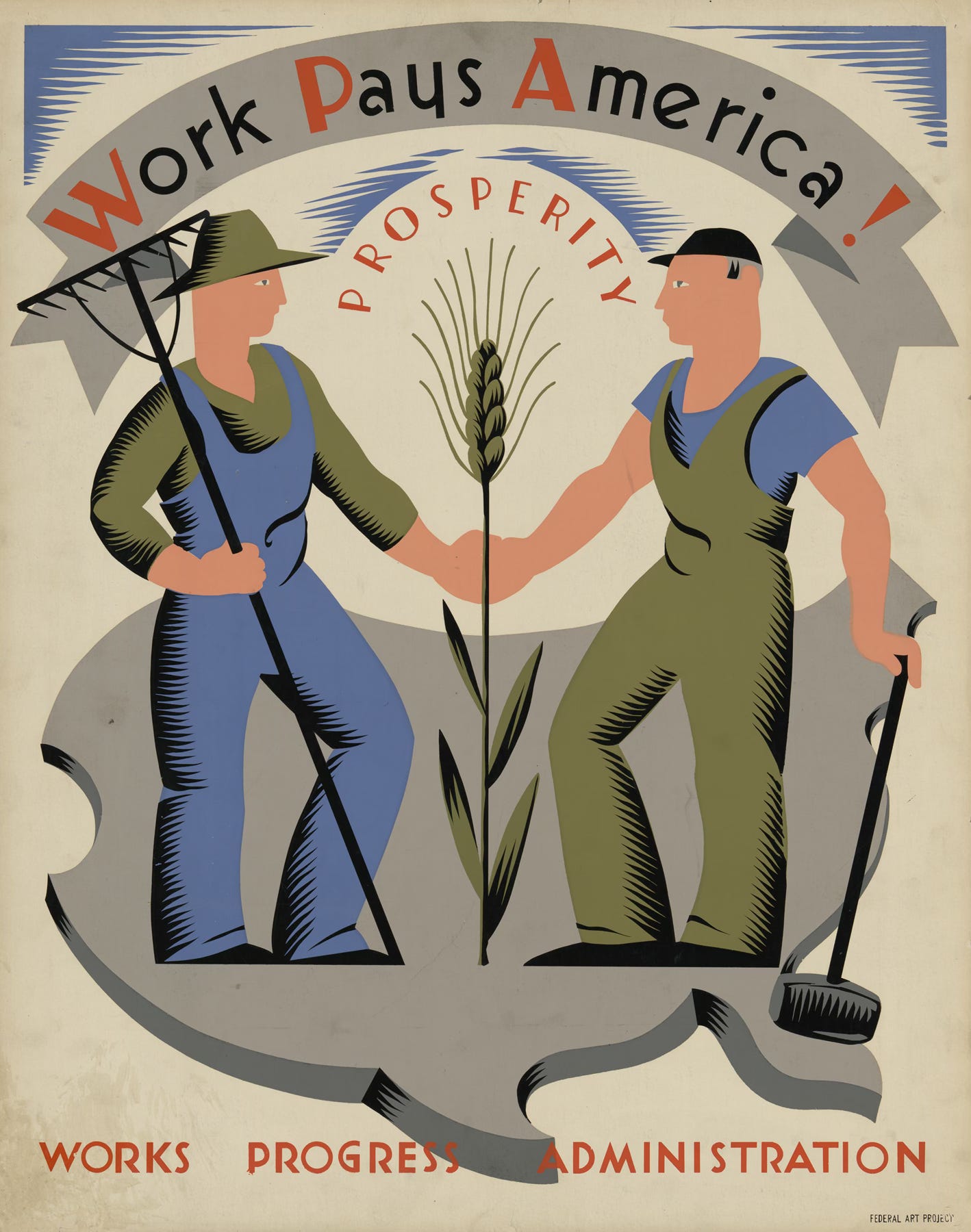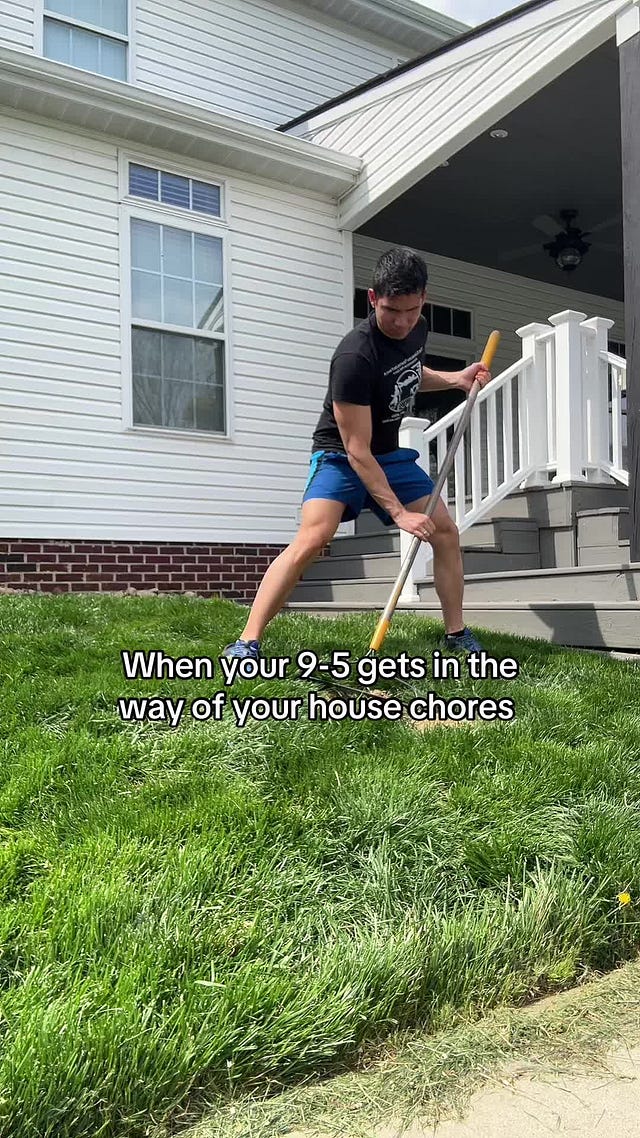Salary Jobs Are How We Get the 20 Hour Workweek
“I don’t like quiet quitting because I am too active”
Today’s piece comes from our friend and grantee, Elle Griffin. She’s last week’s Infinite Loops guest and the founder and editor of Elysian Collective, a writer’s collective exploring utopian futures through essays and print pamphlets. With more than 22k subscribers (and counting!), Elle’s success is living proof that optimism scales. Enjoy the post, and be sure to subscribe to Elysian Collective for more.

David Le was bored at his job, so he got a new one—and never quit the old one.
It was just that he was super efficient—he got more done in a 20 hour work week than his coworkers did with 40. “If I can do your job twice as fast,” he thought, “why can’t I do two 20-hour a week jobs rather than pretend to work 40 at one?”
So he took two salary jobs, both in tech, and was earning more than six figures at each. That’s when he realized he could meet his savings goals much faster. “If you can double dip for three years, then technically you’re working six years,” he told me. “You’re actually getting to retirement in half the time.”
This idea became more common during the pandemic, when jobs went online and working two of them became as easy as running two Slack instances. That’s when Overemployed began, a community of more than 5,000 workers, helping each other navigate the logistical and legal hurdles of double employment.
“A common colleague had nine jobs at once,” Le said. “I think he was earning $900,000 at one point.”
That’s not to say there aren’t risks. A friend of Le’s participated in an online interview and doxed himself, losing both jobs in the process, and high profile cases have exposed individuals who worked the system a little too hard. (David Le, incidentally, is not my source’s real name.) But unless there is a conflict of interest between the two companies, why shouldn’t workers pursue two jobs if they are performing well in both of them?
As Le points out, it’s better than quiet quitting—there are plenty of people who spend the bulk of their 40-hour job doing nothing. “Pre-covid and pre-remote work, it was the water cooler talk, right?” Le says. “Everyone had their long lunches, their walk, their smoke breaks.”
Why not be more productive with those hours? “I don’t like quiet quitting because I’m too active,” Le says. “It’s the over ambitious quiet quitters who are working two jobs.”
I count myself among them. For most of my career I’ve had a day job and a side writing practice. It started in my early 20s, when I worked for a tech startup in the San Francisco Bay Area. I wanted to be good at my job, but I wasn’t willing to sacrifice my personal ambitions. So I came up with a hack, focusing my limited energy only on the most important tasks. Every morning I woke up early and asked myself: “what is the most important thing to me today?” I spent two hours writing, pitching writers and media outlets, and building my online publication before work. When I got to the office, I switched gears and asked myself, “what is the most important thing to my CEO today?” Whatever it was, I spent the morning tackling it with gusto. If he was pitching investors, I worked on his slide deck and researched people he could pitch. If he was trying to impress important analysts, I made marketing campaigns custom tailored to their needs.
The result was that I was always working toward my personal dreams while my boss thought I was doing a great job. Eventually I was the head of marketing at a 100-person company and the founder of a publication with more than 100 writers on the side. Best of all: I got both things done by noon every day! I saved less important administrative tasks for after lunch, but even if I didn’t get to them I always felt that I was delivering in both jobs—I went on long lunch walks with colleagues and could even leave early and still have plenty of time to enjoy my life. When I eventually traded my tech job for journalism and started working remotely, I spent more of my afternoon on personal hobbies and leisure.
Then the pandemic happened and the rise of remote work meant everyone was doing it. We were using our work hours to do laundry, cook meals, and pick up the kids from school.
Many of my friends started side businesses or pursued passion projects. “I spend three hours a day on my job—tops,” one friend, who works for Amazon, told me. She’s so effective at her work that she knocks it out early and spends the bulk of her “40-hour” workweek remotely heading up a nonprofit.
The net result is that we are using the corporate system to fund a parallel system—a passion economy built on the stability of our salary jobs. As Alex McCann put it: “They’re not quitting. They’re using the corporate infrastructure, the steady salary, the laptop, the stability, as a platform for building something real. The corporate role hasn’t died; it’s become a funding mechanism for actual work.”
Our salary jobs have become a stable mechanism through which we can pursue nearly anything else. As tech writer Ashlee Vance put it: “Pretty sure most white collar/office work takes about five hours a week and is basically UBI already to keep people content.”
That will only continue to be the case with the rise of automation. One of my friends recently professed to automating all of the reports he needs to run as a financial analyst, freeing his time up for his consulting practice.
“Honestly, a lot of my work could be done with AI,” Le tells me. “This could all be done with a robot.”
“Work has become very easy due to using AI. What are you doing with your free time?” one user asked on the anonymous tech platform Blink. “I haven’t written a line of code in months.” Another responded. “I just refine my prompts.”
This isn’t true across all industries, of course. Some jobs can’t be automated. Others require 40 hours, or more, on the job. But, during the height of the pandemic, 42% of the workforce went fully-remote which means nearly half of the workforce could be detached from any kind of hourly baseline. According to a recent poll of my subscribers, 31% are still fully-remote, with another 42% mostly remote. And most people aren’t working a full 40-hour work week—51% said they spend less than 30 hours working their salary job and 29% admitted to working less than 20 hours a week.
As we accomplish more of our work in less time, and with the aid of AI and automation, a 20-hour workweek might very well become standard. Hourly jobs could even be tapered to match it. After all, the 40-hour workweek started out as the factory rate before it was expanded to the office sector. Forty is an arbitrary number picked because the 24-hour day could be split into three eight-hour shifts—there’s no reason it’s the “right amount” of work. Why couldn’t the office rate eventually become the new hourly standard?
Eventually we could even achieve the Jetson’s ideal—working 9 hours a week for our companies, but relying on tools that help us get quite a lot of work done in that time, even as we’re supported by the overall earnings from the companies we work for through a decent and livable salary.
Le quit one of his jobs earlier this year. He wanted to take on a more advanced position at work, as well as enjoy more leisure time. For the first time in four years, he’s working one salary job, spending less than 20 hours a week on it, and using the rest of his time for his social life.
Still, he’s getting bored again. “Work is slow,” he told me. “I’ve actually had my boss say, ‘Why do you care so much about taking on extra projects?’ I’m like, ‘I’m just trying to get involved and learn and build.’ If I were to sever these extra projects, I would be bored.”
“Or, have a lot of free time,” he amends. “Which is good.”
Subscribe to The OSVerse to receive your FREE copy of The Infinite Loops Canon: 100 Timeless Books (That You Probably Haven’t Read) 👇👇




